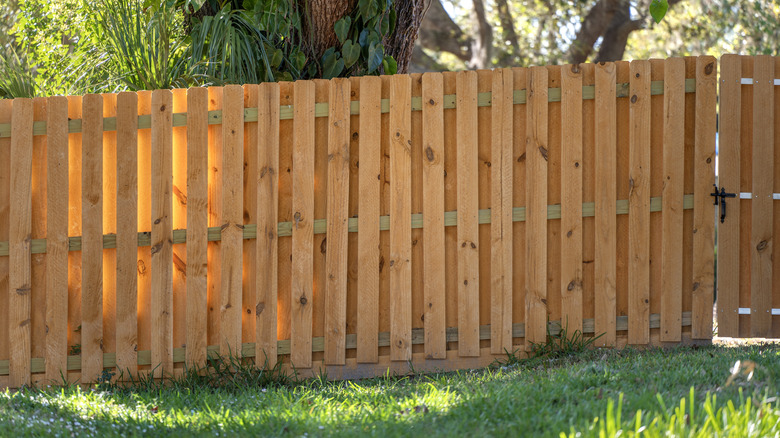Neighbor Built A Fence On Your Property? Here's What To Do
A harmonious relationship with your neighbors can help make your experience as a homeowner more enjoyable, but in some situations, conflict is inevitable. Take fences, for example. You might not have initially thought much of the new fence your neighbor installed, only to revisit your property plans later, perhaps seeking to build your own fence or determine whether a tree you want to cut down belongs to you or your neighbor. After you learn everything you should know about trees and property lines, you realize that part of your neighbor's fence is on your land. Since most people do not maintain an exact idea of where their property lines lie, this realization can come late, long after the encroaching fence has been finished.
If you're adverse to conflict and the property encroachment isn't severe, you might be tempted to let it slide. But even if you don't mind the fence, it can negatively affect your home's value, as your neighbor can make an ownership claim under the doctrine of adverse possession in many states. Adverse possession is the legal process by which a trespasser, in this case your neighbor, can stake a claim to the portion of your property enclosed by their fence, granting them a valid title. The good news is that a claim of adverse possession typically requires the claimant to hold the land for a statutory period of seven to 20 years, depending on your state. So, to keep your neighbor from snatching up part of your property and decreasing its value, what should you do? Fortunately, there are options to ensure you keep the legal rights to your land, even if it lies within your neighbor's poorly placed fence.
Addressing property encroachment with your neighbor (and the law)
An encroaching fence is often the greatest cause of legal disputes between neighbors, but there are ways you can avoid an expensive legal battle. Before you do anything, make sure you know where the actual property lines are. Once you're sure the fence is on your property, the first solution is always communication. Do not assume malice in your neighbor — they could simply be ignorant of their property lines or the associated laws. Let them know their fence is on your land, and they may take it down or move it of their own volition. Do not volunteer to cover the costs of removal, as this could negatively affect you if the situation does result in a legal battle. Just ask your neighbor to remove the part of the fence on your property — once verbally and again in writing to establish that the contact happened. During the process, consider these tips for getting along with difficult neighbors.
If asking nicely doesn't work, take the issue up with your local government. Your neighbor may have constructed the fence without a permit, and if your municipality requires one, you can contact the local zoning officer or a municipal government official and inform them of the situation. They will contact your neighbor about removing the fence and handle any fines associated with improper permitting. If you live in a neighborhood with an HOA, check the covenants regarding fences to see if your neighbor's fence violates any of them. If so, the HOA may request they remove the fence. In the case of an obstinate neighbor, you can file a lawsuit and obtain a court order requiring the fence be removed from your land.
Options that don't involve moving the fence
You might have only become aware of the fence issue when going to sell your house. Since buyers can be turned off by the prospect of a potential legal dispute, you might be motivated to resolve the issue quickly. In this case, you can consider negotiating a boundary line agreement to grant the encroached property to your neighbor, making it legally theirs. However, that decreases the size of your lot and could negatively impact the value of your property. You can also grant your neighbor a license, basically you're giving them legal permission, to allow the fence for a certain period, after which it must be replaced and any new fences must be built within the correct property lines.
When it comes to any legal dispute, it's always a good idea to check with an attorney. Laws regarding fences and property disputes vary by state, so working with a local expert is a good idea. Contact a real estate attorney and discuss your situation to get advice tailored to your unique situation and establish a relationship in case of a legal battle. Even if you don't file a lawsuit, the attorney can advise you of your options and recommend resolutions that don't involve legal avenues. To avoid future property line issues, get in touch with a surveyor about marking your property's boundaries with posts, which will make it difficult for neighbors to claim confusion about where their property ends and yours begins.


